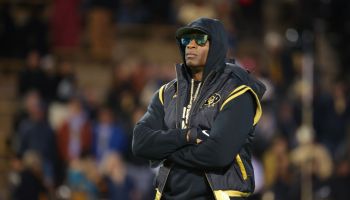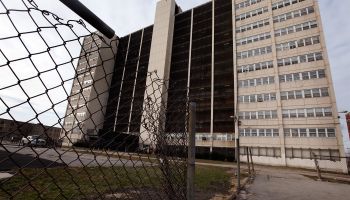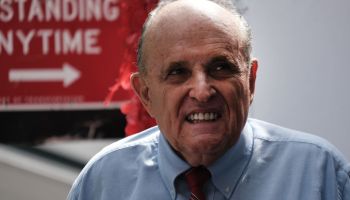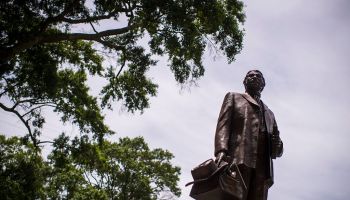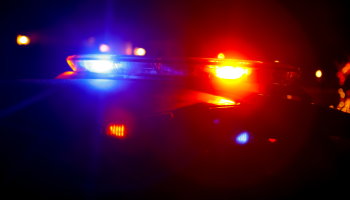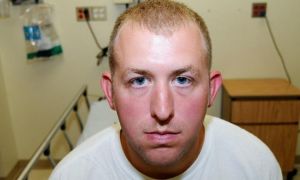
Source: Getty
A little less than a week before the one-year anniversary of Michael Brown Jr.’s fatal shooting — the unarmed Black teenager whose death at the hands of a White police officer sparked what has arguably become the largest Black liberation movement in decades — the New Yorker published a profile of the shooter that explores his life following Aug. 9, 2014 and what he thinks of the aftermath of what many believe to be a racially tinged incident.
The profile — which garnered criticism from Black Lives Matter activists and Twitter users who believe the piece was humanizing a man who killed an 18-year-old boy — aimed to highlight a vein between Darren Wilson‘s often challenging upbringing, his eagerness to learn how to be the best cop, and the shooting that followed his encounter with Brown, though it wasn’t exactly clear how any one of these factors will exonerate Wilson in the court of public opinion (if sympathy is what the New Yorker expected).
What was clear is this: Wilson, whose very name propelled a movement in the Black community calling for justice, doesn’t think race has anything to do with, well, anything.
Interesting for someone who, while having been found not to violate Brown’s rights, was part of a system the Justice Department found to be racially biased. As originally reported by NewsOne, a DOJ report says the discrimination was perpetuated due to the racial stereotypes held by Ferguson city officials. In one incident, officials distributed racist jokes on their city email accounts, including a jab at President Barack Obama and a joke suggesting abortion in the Black community would reduce crime.
But for Wilson, who spoke with the New Yorker’s Jake Halpern over the course of a few days in his “nondescript” St. Louis neighborhood, the Justice Department’s numbers about racial-biased traffic stops, arrests and treatment are “skewed.”
“Everyone is so quick to jump on race. It’s not a race issue,” Wilson told Halpern. There were two opposing views about policing, he said: “There are people who feel that police have too much power, and they don’t like it. There are people who feel police don’t have enough power, and they don’t like it.”
But the lengthy profile has its contradictions. Wilson may not believe race has anything to do with policing, or Ferguson, or the way he reacted on Aug. 9, 2014, but he makes sure to highlight how uncomfortable he was during his first round of policing in a poverty-stricken neighborhood.
Halpern, who describes Wilson as a “six feet four” man who “weighs two hundred and fifteen pounds,” (a curious size for the man who described Brown as a demon who “looked like he was almost bulking up to run through the shots, like it was making him mad that I’m shooting at him”) writes extensively about Wilson’s background as a green cop who felt “intimidated” by Black people.
In 2009, Wilson got a job in Jennings, a town on Ferguson’s southeastern border, where ninety per cent of the residents are black and a quarter of the population lives below the poverty line. “I’d never been in an area where there was that much poverty,” Wilson said. Interacting with residents, he felt intimidated and unprepared.
A field-training officer named Mike McCarthy, who had been a cop for ten years, displayed no such discomfort. McCarthy, a thirty-nine-year-old Irish-American with short brown hair and a square chin, is a third-generation policeman who grew up in North County. Most of his childhood friends were African-American. “If you just talk to him on the phone, you’d think you’re talking to a black guy,” Wilson said. “He was able to relate to everyone up there.”
Wilson said that he approached McCarthy for help: “Mike, I don’t know what I’m doing. This is a culture shock. Would you help me? Because you obviously have that connection, and you can relate to them. You may be white, but they still respect you. So why can they respect you and not me?”
Eventually, Wilson got the hang of policing the neighborhood.
Wilson said that, despite what he’d said about experiencing “culture shock,” race hadn’t affected the way he did police work: “I never looked at it like ‘I’m the only white guy here.’ I just looked at it as ‘This isn’t where I grew up.’ ” He said, “When a cop shows up, it’s, like, ‘The cops are here!’ There’s no ‘Oh, shit, the white cops are here!’ ” He added, “If you live in a high-crime area, with a lot of poverty, there’s going to be a large police presence. You’re going to piss people off. If police show up, it’s because it’s something bad, and whoever’s involved can’t figure out the problem for themselves.”
“When I left Jennings, I didn’t want to work in a white area,” Wilson told me. “I liked the black community,” he went on. “I had fun there. . . . There’s people who will just crack you up.” He also liked the fact that there was more work for the police in a town like Jennings—more calls to answer, more people to meet. “I didn’t want to just sit around all day,” he said.
But examining how fast he reacted to Brown during their 45-second encounter, many believe race and a lack of communication training had everything to do with the death of the unarmed teenager. As Halpern points out, “a recent survey by the Police Executive Research Forum revealed that cadets usually receive fifty-eight hours of training in firearms, forty-nine in defensive tactics, ten in communication skills, and eight in de-escalation tactics.”
It’s likely Wilson will disagree, as he seems to do in the profile that, to its credit, constantly points out the corrupt Ferguson Police Department and the “overt” racism of towns like Ferguson and nearby Jennings. When asked if residents had a legitimate reason to cite racism, Wilson suggested that for many current residents, it’s used as a crutch.
“People who experienced that, and were mistreated, have a legitimate claim,” he told me. “Other people don’t.” I asked him if he thought that young people in North County and elsewhere used this legacy as an excuse. “I think so,” he replied.
But perhaps the most obvious indicator that Wilson, somewhere in the back of his mind, knows it really is about race is his effort to stay away from Black people.
At one point, I asked Wilson if he missed walking outside and going to restaurants. He told me that he still ate out, but only at certain places. “We try to go somewhere—how do I say this correctly?—with like-minded individuals,” he said. “You know. Where it’s not a mixing pot.”
That and his refusal to examine why a nation erupted in protests and civil disobedience following the shooting — his refusal to take a critical look at why Brown’s death hits so close to home for Black communities.
I asked him if he thought Brown was truly a “bad guy,” or just a kid who had got himself into a bad situation. “I only knew him for those forty-five seconds in which he was trying to kill me, so I don’t know,” Wilson said.
You can read the rest of the profile here.
SOURCE: New Yorker | PHOTO CREDIT: Getty
SEE ALSO:
Ferguson Man Charged With Bleeding On Cops Wins Appeal
Justice Department: Ferguson Response To Protesters Violated Free Speech, Use Of Dogs Incited Fear

















